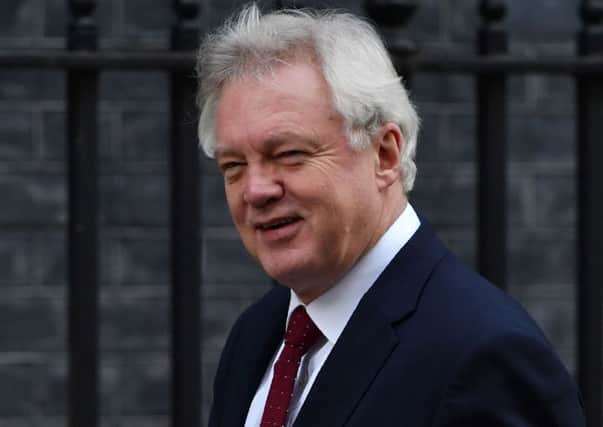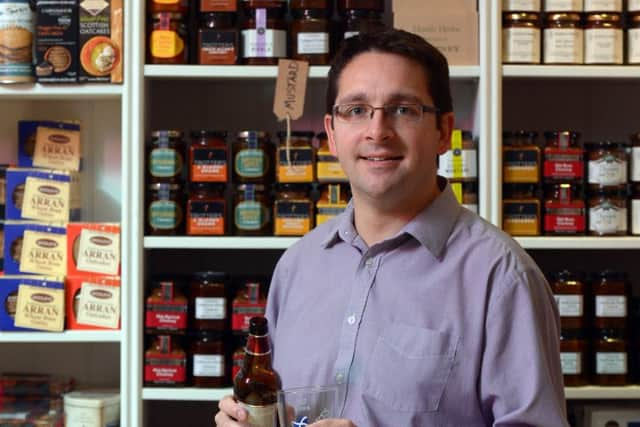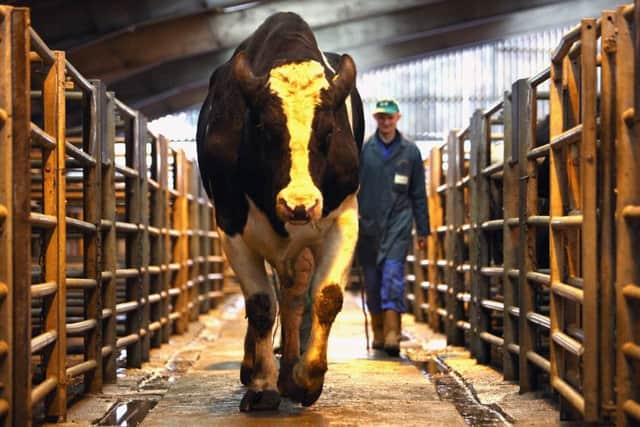Food sector faces '˜terrifying' tariffs after hard Brexit


Scottish exports of red meat worth hundreds of millions of pounds could be “close to wiped out” unless new trading terms are in place on the day the UK leaves the EU, industry leaders warned, along with the prospect of beef and lamb prices plummeting.
Theresa May last week confirmed that the UK would abandon membership of the EU single market and seek to negotiate tariff-free access to the trading bloc instead.
Advertisement
Hide AdAdvertisement
Hide AdHowever, she warned EU leaders that “no deal is better than a bad deal”, threatening to walk out of talks unless the UK is given the right terms.


Such a move would see exports fall under WTO trade rules, with highest the tariffs imposed on the food sector. Yesterday industry leaders warned the charges would make exports of many Scottish staples uneconomic and damage the livelihoods of thousands working in farming and agriculture.
Scotland exports around £1bn worth of food each year, four-fifths of which goes to other EU countries.
James Withers, the chief executive of food industry membership body Scotland Food & Drink, said there would be opportunities to export Scottish produce to new markets after Brexit, but warned the imposition of WTO tariffs would be a “major shock” to farmers and food businesses.
“We are massively reliant on the EU market, so continued tariff-free access is absolutely critical to the Scottish economy, and for the food and drink industry,” said Withers.


WTO tariffs on food products are high in order to protect domestic producers and ensure quality standards are kept.
However, under a hard Brexit, UK farmers exporting to Europe could face punishing tariffs despite continuing to meet the same strict rules.
Skimmed milk exported into the EU from outside the single market attracts a tariff of 74 per cent, while butter is slapped with a 63 per cent tariff and cheddar an additional 43 per cent. A tariff of 53 per cent is levied on wheat exports.
Advertisement
Hide AdAdvertisement
Hide AdRed meat attracts the highest tariffs of all, with charges on frozen beef carcasses reaching 160 per cent of their value.


“At those kinds of prices, it’s difficult to see many European customers being up for trade with the UK,” said Withers.
He cited a working paper by economists at Trinity College Dublin which paints a bleak picture for food producers if the government fails to secure a trade deal or a transition towards one that takes effect the moment the UK leaves the EU.
The paper, published by the Economic and Social Research Institute in Dublin, warns that trade in some food products “comes close to being wiped out” under modelling of the potential impact of WTO tariffs.
Exports of red meat and cereals could be expected to fall by 90 per cent, according to economists Martina Lawless and Edgar Morgenroth.


Overall, UK exports could fall by just under 10 per cent, but food would be the hardest hit. The impact could be even more dramatic as the research assumed the UK would remain a full member of the EU customs union – something which was also ruled out last week, meaning produce could face additional trade barriers and customs checks.
Withers said the paper, which is being independently reviewed for publication in an academic journal, made for “terrifying reading”.
“No deal is a bad deal for the Scottish food industry,” he said. “Over the next 18 months to two years, as well as being about extricating ourselves from 50 years of European ties, there has to be a twin-track approach to getting a new trade deal.” He added that a new tariff-free relationship had to be in place “on the day we leave”, saying: “We really can’t afford any period where we might have to default to WTO trade rules.”
Advertisement
Hide AdAdvertisement
Hide AdWarnings have also been issued by other bodies representing UK farmers about the likely impact of the hardest form of Brexit.
The UK Agriculture and Horticulture Development Board has warned there would need to be a “massive increase in demand” for heavily exported produce such as lamb to sustain current levels of production, while the NFU Scotland has described the imposition of WTO tariffs as the “most damaging scenario for the profitability of British and Scottish agriculture”.
Recalling the impact on lamb producers from the 2001 foot and mouth outbreak, which saw an export ban imposed, Withers said: “We’ve seen before when we’ve been locked out of export markets, it has a catastrophic impact on the sector. You end up with your whole market saturated. Prices can plummet.”
Farming leaders are fearful of the impact of losing out on lucrative subsidies from the Common Agricultural Policy (CAP) which results in about £2.1bn in direct subsidies and £600m in rural development payments. The direct payments made up 55 per cent of farmers’ incomes last year across the UK and are calculated on a flat rate per acre, conditional on fulfilling environmental obligations. Some farmers have called for protectionism, including tariffs, for UK produce. But others feel improved labelling and educating children about farming from a young age is the better approach.
Responding to May’s speech, the chief Brexit negotiator for the European Parliament, Guy Verhofstadt, warned it was “an illusion to suggest that the UK will be permitted to leave the EU but then be free to opt back into the best parts of the European project, for instance by asking for zero tariffs from the single market without accepting the obligations that come with it”.
Britain’s Brexit Secretary, David Davis, said the government will “seek the broadest possible access to it through a comprehensive free trade agreement with the EU.”
He said the UK wanted the “most open possible market with the European Union” that allows trade to continue in “as barrier-free a way as possible” after Brexit, he told MPs last week following the Prime Minister’s speech.